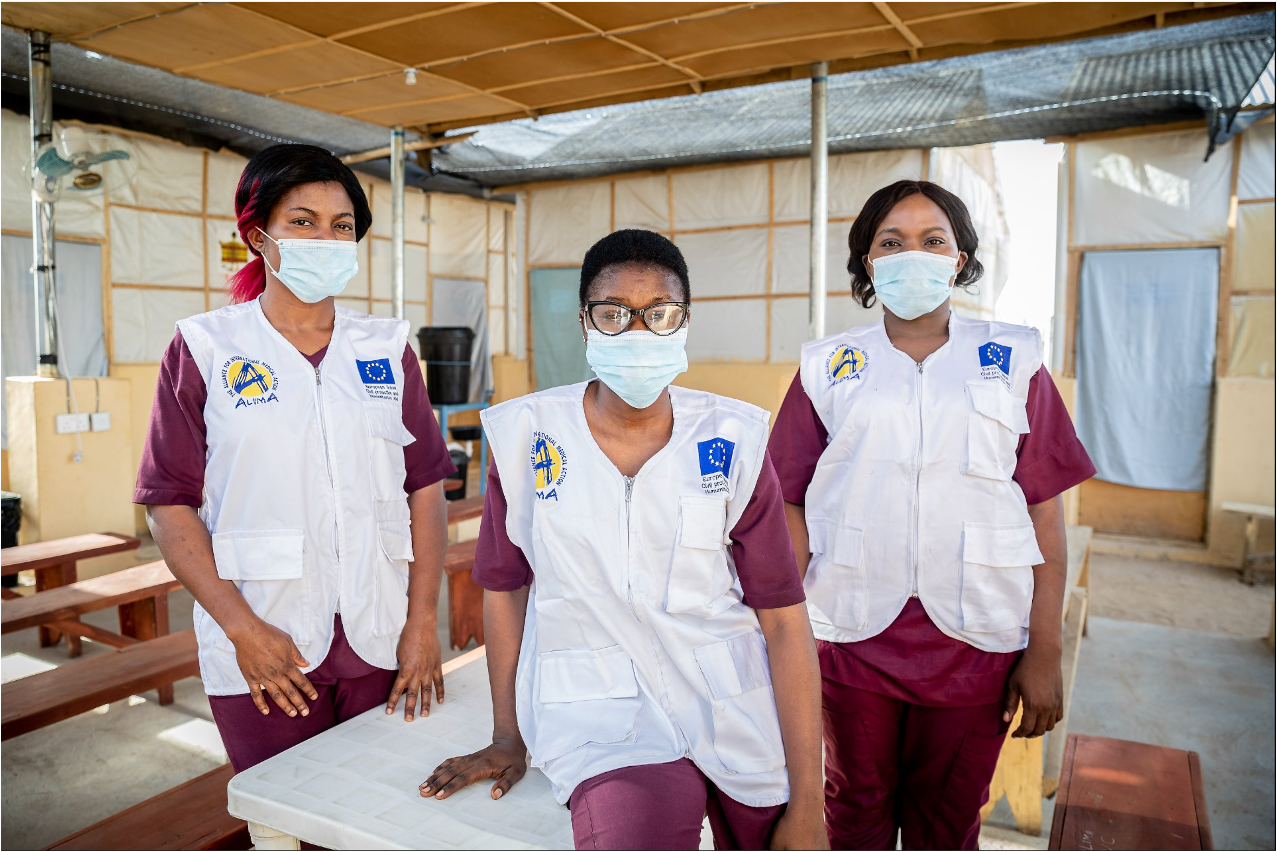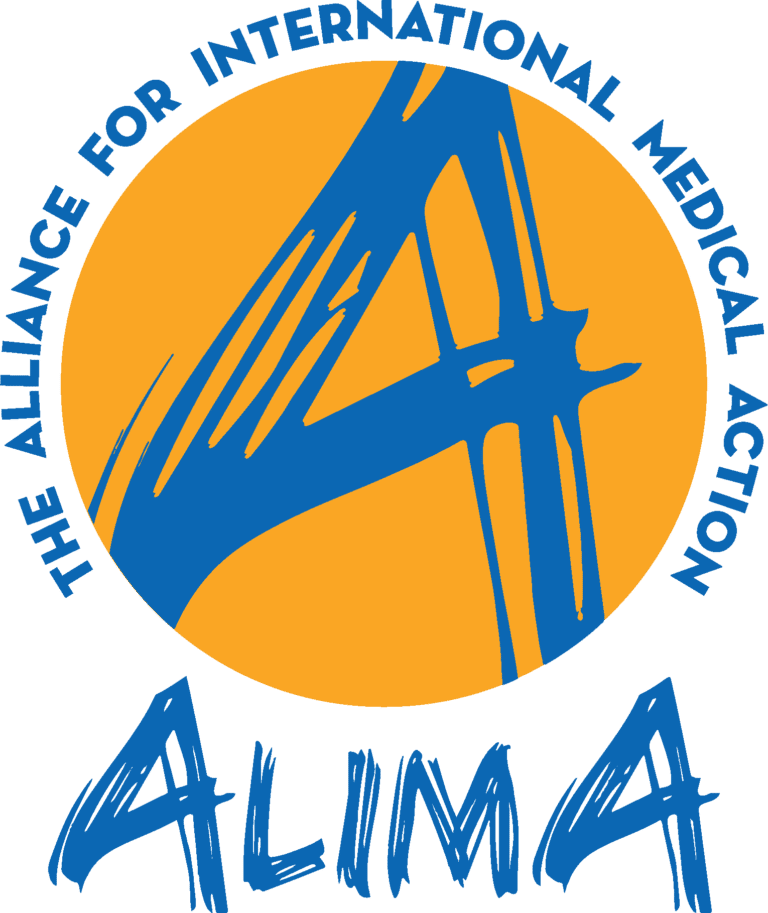“THESE HEALTH CENTERS ARE SAVING US”
Bringing care to those affected by conflict in Nigeria
The persistence of more than a decade of armed conflict in Nigeria has contributed significantly in deteriorating the country’s humanitarian situation, particularly in the Northeast. In Borno State, there are more than 1.3 million Internally Displaced Persons (IDP) . In Maiduguri, the State capital, 382,876 internally displaced persons were recorded. 273,159 are living in formal camps while 109,717 are living in informal camps. There is limited access to food, water, health care or sanitation.
To help meet some of these displaced persons’ needs, ALIMA’s medical and nutritional teams provide them with lifesaving care, and to host community members, at five sites in the Maiduguri area, as well as at the University of Maiduguri Teaching Hospital. Continue reading to learn about ALIMA’s response, stories and photos of some of our patients and staff.
A HOLISTIC APPROACH TO MALNUTRITION
Welcome to the University of Maiduguri Teaching Hospital, more commonly referred to as the UMTH. At the UMTH’s Intensive Therapeutic Feeding Center (ITFC), ALIMA cares for children suffering from Severe Acute Malnutrition with complications, including malaria, respiratory distress and anemia, and provides highly-specialized care in order to improve their chances of recovery and survival.
The ITFC consists of a 57 bed intensive care hospitalization ward, a recreation space for mothers and children, and a special area dedicated to teaching families about the best about the best health and nutritional practices.
Early each morning, Emmanuel Agbom, Nutrition Assistant for ALIMA, prepares and delivers doses of therapeutic milk to children who have been admitted to the ITFC. The milk’s formula helps children suffering from the most serious form of malnutrition to gradually regain weight and to recover while they are still unable to tolerate solid foods.
One such patient is three-year-old Halima. She was admitted to the ITFC because she suffers from Severe Acute Malnutrition and bronchial-pneumonia. To help her breathe, she is connected to an oxygen concentrator.
Her mother, Hadiza, was quite worried, but says: “The care here is good. I have noticed much improvement in my daughter’s health since I came here three days ago. I want the women in my village to know that they can come to this hospital. Every care is given for free and the attitude of the health workers is good.” In addition to treating malnourished children, staff also offer various training sessions to the parents of hospitalized children, to teach them how to prevent and detect malnutrition in their children.
Amos Ishaku, an ALIMA health promoter at the ITFC, leads a cooking workshop. As part of the hands-on cooking lesson, participants learn how to prepare affordable, nutritious meals for their children and family, using locally available ingredients. He also teaches sessions on hygiene.
Aisha Usman, with her son, Idris, on her back, participates in Amos’ food preparation workshop. Like many families who come to the ITFC for care, Aisha and her family are now living in the Maiduguri area as internally displaced persons. She shares her story: “We fled our home because of the insurgency by armed groups. That led to scarcity of food and we didn’t have anywhere to stay,” she explains. “Then I gave birth, but as a result, my baby was always sick and suffered from malnutrition. When we got here, they took care of us. ALIMA is helping us in this hospital.” She continues:
“They are providing care for us and our children, and they are teaching us how to cook and what to eat, and they have also tested our children for malaria and other diseases. Previously, we cooked our vegetables for 30 minutes to an hour, but now we learned how to cook [for a shorter time] to retain the nutrients. We are happy and grateful.”
OUR ACTIONS IN NIGERIA Our humanitarian aid for people affected by the conflict in the region has two main focuses: a recovery center for medical assistance dedicated to malnourished children and a nutritional education center to teach parents proper feeding practices. Watch the video.
Dr. Bukar from the Maiduguri University Hospital explains the use of the MUAC bracelet to the students of the ITFC-schools.
Families are not the only ones who benefit from such training at the ITFC.
Considered a Center of Excellence in Nigeria, the UMTH not only offers specialized care for the most complicated malnutrition cases, but also trains staff from the Ministry of Health to care for these malnourished children. As part of a three-week theoretical and hands-on training program, ITFC-school students learn to screen, detect, diagnose and care for patients by shadowing health staff. This gives them the opportunity to both observe and practice different treatment methods.
“We involve medical students early on to participate in clinical activities so they can learn while in school,” says Dr. L.M. Bukar, doctor and head of pediatrics at the ITFC, and teacher at the UMTH.” Dr. L.M. Bukar, doctor and head of pediatrics at the ITFC, and teacher at the UMTH.
Training sessions take place outside the UMTH as well. At ALIMA supported health clinics located on the outskirts of Maiduguri, mothers and other family members are taught how to use a tricolored bracelet known at the MUAC. It allows families to measure the Mid-Upper Arm Circumference (MUAC), to regularly screen their children for malnutrition. Families can use the MUAC bracelet at home in order to detect the first signs of malnutrition in their children as early as possible and, as a result, reduce their risk of hospitalization.
These training sessions offered by ALIMA are in addition to primary and secondary health services, such as general consultations, outpatient treatment programs for malnutrition, Sexual and Reproductive Health services, and support for victims of Sexual or Gender-Based Violence. ALIMA offers all of these services free of charge to displaced persons and members of the host community.
At Teachers Village Camp (TVC), a camp for displaced persons located on the outskirts of Maiduguri, ALIMA midwife Tracey Akwudo Obinali conducts an examination and checks the vital signs of 25-year-old patient Zara Sani, who will soon give birth.
More than a year ago, following an attack by an armed group, Zara fled her home with her husband and two children. They now live in a nearby camp for internally displaced persons. Throughout her pregnancy Zara came to Teachers Village to attend prenatal consultations and it is here that she will give birth.
“I like this hospital because of how well they attend to me.”
Pregnant women who come to the clinic have access to free pre- and postnatal consultations, assisted deliveries and family planning consultations.
Tracey, along with her fellow TVC midwives, Joy Gokas and Pwakulti Praise Iliya, say that regardless of the background of the women who come to the clinic, they do their best to treat them with the best possible care, to ensure the health of both mother and child.
In the postnatal unit of the dispensary at the Teachers Village Camp, newborn twins nap on their mother’s bed. Their mother, Zainab Usman, fled her home following an attack by an armed group. She now lives in the nearby Madinatu camp for internally displaced persons, but came to Teachers Village Camp to give birth.
Hajja Kellu is an ALIMA nurse and Nutrition Assistant at the Teachers Village Camp health center.
“When we started here, we had about 18 community mobilizers and the ‘Bulamas’ [community leaders]. ALIMA used to have meetings with them, for them to be allowing their wives and children to come here and have the services…
I love helping them, because I am also an IDP here. So I don’t want to see my people suffering.”
Faith Nwafor, Community Management of Acute Malnutrition agent, examines Maryam in the presence of her mother, Fatima Mohammed. She was recently diagnosed as suffering from moderate acute malnutrition and admitted into ALIMA’s outpatient treatment program. At her weekly checkup, Faith notes that Maryam has gained weight and is once again playing.
“What I love most about my work is when we see a patient’s improvement, and also when we can help to impart knowledge about ways to improve hygiene and health.”
Adamu Modu, an ALIMA nurse at the Muna health clinic, checks the weight of eight-month-old Aisha Moustapha, in the presence of her mother, Fatima Ali.
A few weeks ago, Aisha was admitted to ALIMA’s Ambulatory Therapeutic Feeding Center suffering from a high fever and respiratory distress.
Today, during her 10th follow-up checkup, Adamu assures Fatima that Aisha is recovering and will soon be discharged from the program.
As part of the outpatient treatment program for children suffering from uncomplicated forms of moderate or severe acute malnutrition, Fatima received packets of Ready-to-Use Therapeutic Food (RUTF) to supplement her diet during treatment.
Before distributing weekly rations of the nutritional supplement, Hajara Adamu, an ALIMA Nutrition Assistant at the Muna Health Clinic, explains to mothers how and when they should feed their children these small packets of pre-prepared, vitamin-enriched paste.
Falta and her family fled their home four years ago and now live in the nearby Muna Garage camp for internally displaced persons. Umara, who is suffering from moderate acute malnutrition, was admitted to ALIMA’s ambulatory treatment program. His mother and he are back today for a routine check up.
Initially weighing just 5.8kg, after a few weeks of outpatient treatment Umara now weighs 6.3kg and his health has greatly improved.
“Thank you,” Falta says. “These health centers are saving us.”



